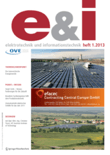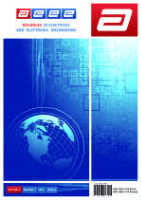
Elektrotechnik und Informationstechnik
Scope & Guideline
Illuminating the Path of Electrical Engineering Advancements.
Introduction
Aims and Scopes
- Energy Systems and Sustainability:
Research related to energy efficiency, renewable energy integration, and sustainable energy systems. This includes techno-economic evaluations, energy storage solutions, and the impact of energy transitions on grid stability. - Power Electronics and Electrical Machines:
Investigation of advanced power electronics, electrical machines, and their control strategies. This encompasses modeling, optimization, and performance analysis of various electrical devices and systems. - Automation and Control Systems:
Focus on automation technologies, control systems, and their applications in industrial processes and smart grid solutions. This includes the development of algorithms for intelligent energy management and control. - Communication and Interoperability in Energy Systems:
Studies addressing the integration of communication technologies within energy systems, emphasizing interoperability, data management, and the role of digitalization in enhancing system performance. - Robotics and Intelligent Systems:
Research on the application of robotics and AI in electrical engineering, exploring areas such as sensor technology, automation in manufacturing, and advanced data analytics for system optimization. - Electromagnetic Compatibility and Safety:
Examination of electromagnetic interference, safety protocols, and regulatory aspects related to electrical installations and equipment, ensuring compliance with international standards.
Trending and Emerging
- Decarbonization and Climate Neutrality:
Research on strategies and technologies aimed at achieving carbon neutrality in energy systems is gaining traction, reflecting global priorities towards sustainable energy solutions. - Smart Grids and Digital Transformation:
The trend towards smart grids and digital transformation in energy systems is prominent, focusing on the integration of IoT, AI, and big data analytics for enhanced operational efficiency. - Energy Storage Solutions:
Growing interest in advanced energy storage technologies, including battery systems and hybrid solutions, to support renewable energy integration and grid stability. - Machine Learning and AI Applications:
The application of machine learning and AI for predictive maintenance, optimization of energy systems, and automation in manufacturing processes is rapidly emerging as a key research area. - Electromobility and Charging Infrastructure:
Research on electric mobility and the development of sustainable charging infrastructure is trending, driven by the global shift towards electric vehicles and associated technologies. - Cybersecurity in Energy Systems:
The importance of cybersecurity in protecting energy systems from emerging threats is increasingly recognized, leading to research on secure communication protocols and risk management strategies.
Declining or Waning
- Traditional Transmission Technologies:
Research on conventional transmission technologies and their limitations is less prevalent as the focus shifts towards innovative and sustainable solutions for energy distribution. - Low-Power Analog Circuits:
The emphasis on low-power analog circuit design has waned, likely due to the increasing integration of digital technologies and power management systems that overshadow traditional analog approaches. - Static and Conventional Control Systems:
Static control systems are becoming less relevant as dynamic and adaptive control strategies, including machine learning applications, gain more attention in system management. - Classic Electrical Machine Designs:
Research on traditional designs of electrical machines is declining, with a growing focus on novel materials and innovative configurations that enhance performance and sustainability. - Conventional Energy Generation Methods:
Interest in conventional energy generation methods is decreasing as the journal emphasizes renewable energy technologies and innovative solutions for energy transition.
Similar Journals

Electrical Engineering & Electromechanics
Connecting Knowledge and Innovation in EngineeringElectrical Engineering & Electromechanics, published by the Natl Technical University, Kharkiv Polytechnic Institute, is a leading open access journal that has been disseminating cutting-edge research in the fields of electrical and electronic engineering, energy engineering, and mechanical engineering since its inception in 2006. With ISSN 2074-272X, this journal not only contributes to the advancement of engineering science but also provides a platform for knowledge sharing among researchers, professionals, and students globally. The journal holds a notable position within the academic community, being classified as Q3 in 2023 across multiple categories, highlighting its relevance and influence in the engineering discipline. With Scopus rankings revealing its percentile standing, the journal is positioned to foster innovation and discussion in a rapidly evolving field. The open access model ensures that all published articles are freely available, enhancing the visibility and impact of high-quality research. As it converges towards the years of 2019 to 2024, Electrical Engineering & Electromechanics aims to continually publish groundbreaking studies while encouraging contributions that drive technology and electrical advancements forward.

IEEE Latin America Transactions
Catalyzing Scientific Progress in Latin AmericaIEEE Latin America Transactions is a distinguished journal published by the Institute of Electrical and Electronics Engineers (IEEE), focusing on the broad and impactful fields of Computer Science and Electrical and Electronic Engineering. With an ISSN of 1548-0992, this journal serves as a vital platform for scholarly communication, featuring high-quality research articles that contribute to advancements in these technical domains. As of 2023, it holds a commendable Q2 ranking in Computer Science (Miscellaneous) and a Q3 classification in Electrical and Electronic Engineering, reflecting its significant contributions to the field. The journal spans from 2003 to 2024, ensuring a rich archive of contemporary and relevant research. Researchers and professionals can access its articles without open access restrictions, enhancing its visibility and reach across the global scientific community. Set against the backdrop of its operational base in Piscataway, NJ, this journal not only serves as an academic repository but also plays a crucial role in bridging knowledge gaps in Latin America and beyond.

IEEE Electrification Magazine
Exploring the Frontiers of ElectrificationIEEE Electrification Magazine, published by the Institute of Electrical and Electronics Engineers (IEEE), serves as a pivotal platform in the field of Electrical and Electronic Engineering. With an ISSN of 2325-5897 and an E-ISSN of 2325-5889, this esteemed journal aims to bridge the gap between research and practical applications in electrification, addressing current trends and technological advancements since its inception in 2013. Notably recognized as a Q1 journal in Electrical and Electronic Engineering and a Q2 journal in Energy Engineering and Power Technology for 2023, it ranks in the 72nd and 69th percentiles, respectively, within its categories according to Scopus. As a vital resource for researchers, professionals, and students, it delivers thought-provoking articles that stimulate discourse and innovation within the electrification landscape, though it currently does not offer open access. The editorial excellence and rigorous peer-review process ensure that each published piece contributes meaningfully to the dynamic field of electrification, solidifying the journal’s importance as a leading voice in advancing engineering practices and education.

Revue Roumaine des Sciences Techniques-Serie Electrotechnique et Energetique
Driving progress in Electrical Engineering and Energy studies.Revue Roumaine des Sciences Techniques-Serie Electrotechnique et Energetique is a distinguished journal published by EDITURA ACAD ROMANE, focusing on the vital fields of Electrical and Electronic Engineering and Energy studies. With a notable history since its inception in 1969, this journal serves as a significant platform for disseminating research and advancements in these disciplines, particularly within the context of Romanian and broader European scientific communities. Although it operates on a traditional access model, it maintains relevance with a Q3 quartile ranking as of 2023 in both the Electrical and Electronic Engineering and Energy categories. With its inclusion in Scopus rankings indicating its growing influence, Revue Roumaine des Sciences Techniques actively contributes to the body of knowledge, providing valuable insights and fostering innovations that resonate with researchers, professionals, and students alike. The journal encourages submissions that address contemporary challenges and developments in technology and energy management, facilitating a collaborative exchange of knowledge that is crucial for both academic and practical applications.

Advances in Electrical and Electronic Engineering
Fostering Breakthroughs in Engineering ExcellenceAdvances in Electrical and Electronic Engineering is a distinguished peer-reviewed journal published by VSB-TECHNICAL UNIVERSITY OSTRAVA, fostering an open-access platform since 2002 that is instrumental in disseminating innovative research and developments in the field of electrical and electronic engineering. With an ISSN of 1336-1376 and an E-ISSN of 1804-3119, this journal provides a vital resource for researchers, professionals, and students striving to stay at the forefront of this dynamic sector. Despite its present Q4 ranking in the Electrical and Electronic Engineering category and a Scopus rank of 598 out of 797, the journal aims to elevate its impact and reach through dedicated contributions that explore emerging technologies, theoretical advancements, and practical implementations. With its commitment to accessibility, authors are encouraged to publish work that can significantly advance our understanding of electrical systems and contribute to the global engineering community from its base in Czech Republic.

Electrical Control and Communication Engineering
Illuminating the path to groundbreaking engineering solutions.Electrical Control and Communication Engineering is a premier Open Access journal dedicated to the vibrant fields of electrical engineering, control systems, and communication technologies. Published by SCIENDO, this journal not only aims to disseminate significant research findings since its inception in 2012 but also fosters a collaborative platform for researchers, professionals, and students from around the globe. With its commitment to high standards and rigorous peer review, the journal seeks to advance the collective understanding of innovative technologies and methodologies in electrical control and communication systems. With an ISSN of 2255-9140 and an E-ISSN of 2255-9159, the journal is gaining visibility and impact within the academic community, encouraging open and accessible scholarship to drive progress in this critical sector. Housed in Warsaw, Poland, it is poised to be an invaluable resource for those engaged in cutting-edge research and applications in electrical and communications engineering.

IEEE INDUSTRY APPLICATIONS MAGAZINE
Unveiling Trends that Shape the Industry.IEEE Industry Applications Magazine, published by the IEEE Institute of Electrical and Electronics Engineers, is a distinguished periodical that dives into the multifaceted field of industrial applications of electrical and electronic engineering. With its roots dating back to 1995 and advancing through to 2024, the magazine offers practitioners and researchers valuable insights through a range of articles that cover emerging trends, innovative technologies, and practical solutions across key areas including Control Systems, Energy Engineering, and Industrial Manufacturing. Although not an open access journal, it holds a notable Q3 ranking across multiple categories, revealing its relevance and contribution to the industry. The journal serves as an essential resource for professionals seeking to stay abreast of advancements and methodologies that drive the industrial sector forward. As a prominent publication in its field, IEEE Industry Applications Magazine plays a critical role in fostering knowledge exchange and shaping future innovations in engineering.

Smart Energy
Exploring Tomorrow's Energy Solutions TodaySmart Energy, an esteemed publication by ELSEVIER, stands at the forefront of energy research, exploring innovative solutions and sustainability practices in the energy sector. With an impressive Open Access model since its inception in 2021, this journal has rapidly established itself as a vital resource for researchers and professionals alike, providing unrestricted access to high-quality peer-reviewed articles. Positioned in the Q1 category across multiple fields, including Energy Engineering and Power Technology, Renewable Energy, and Management, Monitoring, Policy and Law, Smart Energy demonstrates a strong commitment to advancing knowledge in the energy domain. Registered under the ISSN 2666-9552, it garners significant attention, ranking within the top ranges of Scopus metrics across various disciplines. The journal continuously aims to bridge the gap between academic research and practical application, making it an essential outlet for scholars and practitioners dedicated to fostering sustainable energy solutions worldwide. Located in the United Kingdom, Smart Energy is shaping the future of energy management from its publishing base in Amsterdam, the Netherlands.

Journal of Control Automation and Electrical Systems
Connecting Theory and Practice in Electrical EngineeringThe Journal of Control Automation and Electrical Systems, published by SPRINGER, is a prominent academic journal dedicated to advancing research in the interdisciplinary fields of control systems, automation, and electrical engineering. With an ISSN of 2195-3880 and E-ISSN of 2195-3899, this journal has emerged as a vital platform for disseminating high-quality research, contributing significantly to both theoretical and applied aspects of these interrelated domains. As of 2023, it ranks in the Q2 and Q3 quartiles across multiple categories, including Electrical and Electronic Engineering and Energy Engineering, showcasing its relevance and impact in the field. Although not an open-access journal, it provides rich access options for research works, ensuring that findings reach a wide audience. Researchers, professionals, and students alike can draw valuable insights from its curated articles that explore emerging trends, innovative technologies, and practical applications, thus reinforcing its position as a key contributor to the advancement of control and automation systems.

Facta Universitatis-Series Electronics and Energetics
Advancing Knowledge in Electronics and Energetics.Facta Universitatis-Series Electronics and Energetics is a prestigious open-access journal published by UNIV NIS, focusing on the fields of electronics and energy systems. With its commitment to disseminating cutting-edge research since 2004, the journal plays a significant role in fostering innovation and collaboration among scholars and practitioners in these vital disciplines. The journal welcomes a broad spectrum of topics, including electronic engineering, renewable energy technologies, energy efficiency, and smart grid solutions. As an accessible research outlet, it caters to a global audience, making high-quality research available to everyone regardless of geographic or institutional barriers. Researchers, professionals, and students will benefit from the journal's diverse contributions, ensuring they stay at the forefront of developments in electronics and energetics. The journal has established its authority within the field, enhancing visibility and engagement opportunities for authors and readers alike.